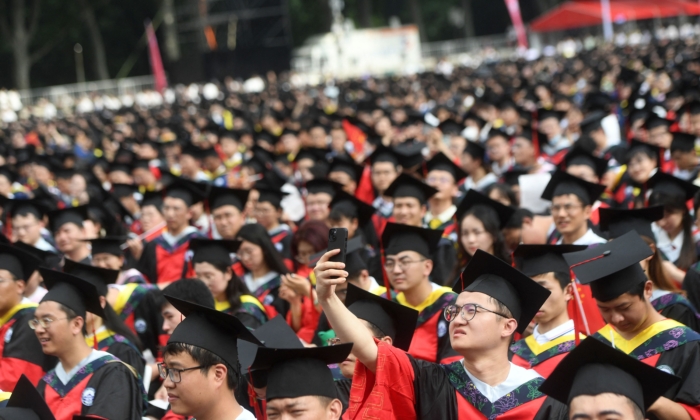Analysts told The Epoch Times this could fuel discontent with the regime and create catalysts for social unrest.
A record number of new college graduates is set to hit China’s job market in 2025, while this year’s graduates are still struggling to find employment amid a sluggish economy.
The large number of college graduates will exacerbate China’s unemployment crisis and could lead to social unrest, analysts told The Epoch Times.
In 2025, more than 12.2 million students will complete their third-level education, up 430,000 from this year’s number, according to China’s state media Xinhua News Agency, which cited data revealed at a joint meeting held by the Ministry of Education and Ministry of Human Resources and Social Security on Nov. 14.
However, due to Chinese authorities’ past record of underreporting and covering up information, it is difficult to assess the true youth unemployment rate, which could still be higher.
In July, the Chinese edition of The Epoch Times interviewed a recently emigrated Chinese civil servant who was a journalist in China. He stated that local governments had been inflating youth employment statistics to meet the demands of their superiors.
In June last year, China’s youth unemployment rate, including students, hit a record 21.3 percent, according to official statistics. Still, Zhang Dandan, a professor at China’s elite Peking University, estimated that the actual number in July could have been 46.5 percent.
In comparison, the youth unemployment rate in the United States was 9.8 percent in July, and the European Union’s youth unemployment rate in September stood at 14.8 percent, according to statistics released by the U.S. Department of Labor and the European Commission.
Sun Kuo-hsiang, a professor of international affairs and business at Nanhua University in Taiwan, told The Epoch Times that without creative government or market-led solutions, the large number of new graduates will likely push up the youth unemployment rate next year, in turn further entrenching China’s economic slowdown, leading to a “vicious cycle.”
Last month, 3.4 million applicants had registered to compete for next year’s 39,700 public sector vacancies, official figures show. The most competitive position drew 16,700 applicants.
Sun said that employment challenges may increase social instability, “particularly in second- and third-tier cities and rural areas, where returning graduates will put additional pressure on local governments.”
Combining that with the Chinese regime’s authoritarianism, an unstable job market “would damage people’s trust in the authorities, cause dissatisfaction, especially among young people, and challenge the authorities’ ability to stabilize the overall situation,” Sun said.
The authorities will then spend more on limiting freedoms, leading to another vicious circle and hurting China’s global attractiveness, “especially in attracting investment and talent,” he added.
Lai Rongwei, CEO of the Taiwan Inspirational Association, warned that the youth unemployment problem is a “ticking bomb,” especially under the Chinese regime, where young people are unable to vote the Chinese Communist Party out of power.
Lai pointed to the “lying flat” movement, in which young people adopt a stance of passive resistance by doing only the bare minimum required to survive, such as controlling spending money and avoiding getting married and having children. He said this phenomenon indicates the youth’s pessimism about the future.
They feel “their efforts are futile. Given the structure of the entire society, no matter how hard they try, they will just be exploited more,” Lai said.
Edward Huang, an economist and media commentator from Taiwan, said that China’s youth unemployment will likely worsen next year.
“If one can’t find a job within five years, it’s likely they will never find a job, and chances are they may harbor resentment toward the authorities,” Huang said.
Huang said the Chinese authorities’ recent clampdown on a night cycling trend by university students in Kaifeng city, Henan Province, indicated that “China’s society is now very fragile.”
“Any minor disturbance, gathering, or social movement may have a fatal impact on the CCP,” Huang said. “Thus, the CCP will be vigilant and implement strict measures to suppress any potential threats to its rule.”
Luo Ya contributed to this report.

